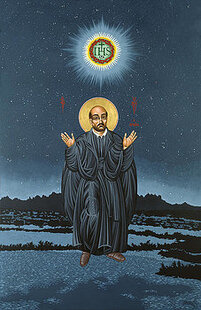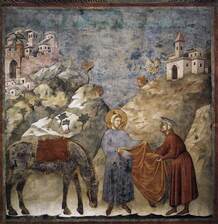 Travel experts wisely advise that when visiting a foreign country we should go off the ‘tourist track’ and go where the locals go, eat where they eat, etc., so that we get a truer sense of the place we are visiting. This has proven to be wonderful advice because we only pass through some places once in a lifetime. And because this may be so, it is important that we savor the natural beauty or uniqueness of a particular spot by immersing ourselves in it. By listening to the sounds of different birds, smelling the air which might carry the fragrance of native plants and flowers, and taking in the general ambiance, we can create a mental picture to take home, letting the place leave an imprint on our heart. Photos are nice, but it is important to truly be in the place where we are presently, especially one we may never see again. In this way, we might pass through only briefly, but when we leave, our hearts are somewhat changed so that we are not the same as when we arrived. And even if we were to return to a place on multiple occasions, it is never the same experience with each subsequent visit. True, things change locally, but the deeper reality is that everything is different because we are not the same. We return with extra layers of experience, some joyful and some painful, and hopefully, with extra wisdom. No matter where we go we can only take away that which is absorbed into our hearts. The truth is, no matter how much we want to hang on to anything, anywhere, or anyone in life, we are only passing through. But the beauty of it is that we are passing through with a purpose and a goal: our purpose is love and our goal is to be in Heaven with God forever.  To be clear, the source of the wisdom to do this lies with St. Ignatius of Loyola (feast day July 31) who taught that we should “relish” experiences because they are gifts from God. At the beginning of his spiritual life, (after his famous conversion), Ignatius spent a few years traveling on foot as a pilgrim. During this time, he learned how to savor everything. He discovered that it was not just about the destination and the physical exertion it took to walk from one place to another, but it was about the process. At the beginning he was so zealous that his tendency for scrupulosity got out of control. He lost focus on his exterior surroundings and worse still, on how God was calling him, zeroing in on his own sins and weaknesses which he perceived to be many at that point. Thankfully, God broke through to him in a dramatic way on the banks of the Cardoner River, an event which marked a huge turning point for him, beginning the formation of Ignatius into a master of spiritual discernment. St. Ignatius went on to compose his famous Spiritual Exercises, a directed retreat experience which at its core is about learning how to savor, to recognize God’s presence, and to listen to His voice through the process of spiritual discernment * so that we would come to know Him and thus serve and love Him better. Our goal is to always choose what leads us closer to God, while learning how to recognize God’s presence so that we might grow in holiness and discipleship.  The reflection and discernment which are intrinsic to Ignatian spirituality remind us that we are only passing through, and so we want to make best usage of the gift of the time we have at any given point. It is important to realize that we do not really possess anything, except our heart and our will which we can freely offer to God. It is the only return which we can make to Him, and it is the one in which He delights the most. As to the rest, we are simply stewards: we are stewards of our material goods, of the earth, of the hospitality and welcome we should give to others, and as such, we are stewards of relationships. In other words, we do not possess all that will fall away and become dust, just as we do not possess people or the earth. Rather, we are to make best use of these gifts and then pass them on to others when the time has come. Everything in life requires this letting go. Therefore we must not cling, even in relationships. And while some relationships are more enduring than others, our love should allow (and encourage) the other to make changes, especially those which involve personal growth. The result of this letting go, even if the other moves away physically, is a growing closer within our hearts through the true love of friendship. This is how it ought to be with God: our relationship with Him is the most important relationship of all, and so when it feels as if He is distant, because we have cultivated a relationship of faith, hope, and love with Him, we know He is nearer than we might be able to perceive.  St. Ignatius of Loyola provided a wealth of spiritual wisdom throughout his lifetime, especially through his Spiritual Exercises. Part of the ‘genius’ of the Exercises (which are truly directed by God and discerned by one’s director) is that everything within them ties together. At the beginning the retreatant freely accepts that everything is a gift to be used for the greater glory of God, and that all things are for this purpose. Thus, we do not cling to anything. Another way to put this is that we are only passing through and everything is intended as a way to help us discover “the purpose for which we are created.”** At the conclusion of the Exercises, the retreatant accepts this spiritual truth far more deeply: through the process, we come to understand more about our purpose and goal, which is Love. To this end, St. Ignatius provides a prayer, referred to as the Suscipe, as the response of the retreatant who at this point is so filled with gratitude and love that this offering is deeply heartfelt and sincere. It begins with the words, “Take, Lord, and receive all my liberty, my memory, my understanding, my entire will, all that I have and possess.”*** The retreatant now knows with experience that indeed everything is a gift not to be possessed or clung to, but is a means to the end for which we were created: to know, serve, and love God better and to know the depth of His love for us. Therefore, the retreatant has learned to see that our response of self-giving is the best (and only) thing we can ever give to God.  St. Ignatius understood the message of love taught by Jesus. He knew that living the Christian life means we are a type of missionary, a missionary of love. As such we recognize that wherever we go, we are passing through, not aimlessly, but with a goal: to share love and to lead others (and ourselves) closer to God who ‘labors for us,’ too. The only permanence we seek is that of Heaven, the rest is a means to that end. This is not to say that we are to use things indiscriminately or selfishly, as if to throw them away when we are finished. No, it means that we utilize both our talents and our material goods for the greater good (with love and gratitude) because we know we are stewards, not owners. Therefore, we give glory to God when we treat others with the respect and dignity they deserve, when we reverence the beauty of the gift of nature, and when we work toward peace and justice in little ways by our daily actions in order to assist in building the Kingdom.  If we accept the reality that we are only passing through, we will learn to savor each moment with each person in a new way, and we will keep our eyes focused on the Lord, the source of all joy, even when we are in the midst of pain. We will find an inner freedom so that we are not prisoners of our possessions, but are more able to share what we have with others, and we will be less prone to grieve when our things are gone or our health diminishes due to disease or the aging process. Let’s not be deluded: much about this is not easy, but with the purpose of love and the goal of life with Jesus in Heaven forever, we can embrace our passage through time as the wonderful gift that it is meant to be, sharing precious moments with loved ones as well as with those who are in need, finding Christ in our midst and love in the hidden places during our journey. Indeed, we are only passing through this life so that we may have permanence in the next. May we have prayerful insight into recognizing the purpose for which we have been created! May we come to see the wisdom of letting go of all that which can hold us back from that purpose! May we ask for the intercession of St. Ignatius of Loyola that we might discern wisely as we try to choose that which leads us closer to God! May we come to greater interior freedom by seeing all created things as means to an end, which is the Kingdom of God! And may we have gratitude for the many gifts we have been given so that we might freely share them with others, assisting them by our little acts of kindness! Let us continue to meet in the Heart of Jesus! Peace! ©Michele L. Catanese Notes: Next post, August 12 * In the next post, I will deal with discernment of spirits, a key principle in Ignatian spirituality. There was simply too much to say in a single entry. ** Principle and Foundation, paragraph 23 in The Spiritual Exercises of St. Ignatius Loyola. To read it, click here: https://www.bc.edu/content/dam/files/offices/ministry/pdf/First%20Principle%20and%20Foundation%20-March%202015%20%282%29.pdf *** Suscipe, (Take Lord Receive) paragraph 234, ibid. The text of the prayer is at the beginning of another excellent article. To read it, click here: https://www.ignatianspirituality.com/ignatian-prayer/prayers-by-st-ignatius-and-others/suscipe-the-radical-prayer/ Images: 1. My photo, Glen Etive, in the Highlands of Scotland: I chose this because it is a place which I truly felt etched itself into my heart. It was so beautiful and quiet, even with many hikers in the area. While I only passed through, it was a place which I savored. 2. Icon, St. Ignatius the Pilgrim, by Fr. William Hart McNichols: This icon was perfect for depicting the early stage of the spiritual journey of St. Ignatius of Loyola into the spiritual powerhouse he became. He began to understand the 'art' and importance of discernment of spirits during this time. If you are interested in a copy of this icon in one of many mediums, you can find it at https://fineartamerica.com/featured/st-ignatius-the-pilgrim-021-william-hart-mcnichols.html 3. My photo, taken in Mount Desert Island, near Arcadia National Park, Maine: This photo seems to capture the nature of our spiritual journey insofar as the clear sky and calm seas, but with the fog in between the two. Spiritual discernment helps us to cut through the fog a bit, by relying on the Holy Spirit to help us become closer to God, sort of a spiritual GPS. (Perhaps in this case GPS could stand for 'Godly Positioning System?') 4. Icon, St. Ignatius in Prayer Beneath the Stars, by Fr. William Hart McNichols: This is perhaps my favorite icon of St. Ignatius. I love it because of the obvious contemplation he is engaged in, but it also depicts that he was a great mystic as well. That his feet are not on the ground spoke to me of letting go: he is not attached to anything and all is for the greater glory of God. 5. Painting, St. Francis Gives His Cloak to a Beggar, Giotto (1299): This painting is in the upper church in the Basilica of San Francesco in Assisi, Italy. I really like the work of Giotto, and chose this one because if ever there was a Christian missionary of love, St. Francis was it. He imitated Christ more than any other saint insofar as he truly loved everyone, regardless of who they were or what disease they had, poor or rich. 6. My photo, on the ferry crossing the Long Island Sound from New Haven, Connecticut to Orient Point, NY: This photo seemed to capture the theme of passing through once. I have actually made this trip a number of times, but every time it seems different. And in fact it is always different due to variables in the weather, the season of the year in which the travel is done, the passage of time between trips, etc. It is a reminder that while I may have taken this trip before, each particular time is singular and unique, unlike any before or to come. We only pass through in this way once. NOTE: In compliance with GDPR rules, I wish to make it clear that I do not gather any information on any of my readers at any time.
Madonna Braun
7/29/2019 09:40:31 am
Flavio Bravo is a friend I’ve known for a number of years and I received the link this morning. I am definitely going to follow you for a trial and love what I see. Thank you.
Elise
7/29/2019 05:23:37 pm
I was so touched by your sharing on St Ignatius and his influence through his Spiritual Exercises on your views of life. I needed to read your comments and ponder again the gifts of love, friendship
David
7/30/2019 10:06:30 am
Michele, I am thrilled to see that your Scottish-ness continues, especially in the photograph of the truly beautiful Glen Etive.
Carmella
8/5/2019 09:32:28 am
What an incredible reminder of how deeply we are loved and the opportunity to reflect on that especially when in grief. Take Lord receive all I have and possess..., including relationships with loved ones. As I read this I reflected on the pain I'm feeling as I grieve and I'm reminded by God's Grace I was able to love so deeply and the pain is an affirmation, to me, of God's love and favor. Love and blessing to all those who read this. Comments are closed.
|
Heart Speaks to Heart
|

 RSS Feed
RSS Feed

